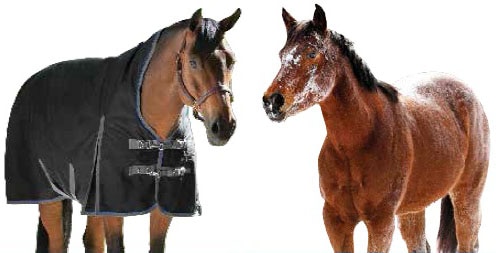
We’re going to start with the blanketing basics: whether or not to blanket your horse in the first place. Like most things in the horse world, the short answer to this age-old debate is that it depends. Every horse is an individual, and the decision to blanket should be based on their unique needs (and not just because their rider is cold!). Below, you’ll find the pros of blanketing and not blanketing, plus four factors you should take into account when deciding if, when, and how much to blanket.
The pros of blanketing
Pro for your horse:
If he wears a waterproof turnout blanket, he’ll be protected from the elements when he’s outside.
Pro for you:
Your horse will stay clean, dry, and ready for you to ride even if he lives outside.
The pros of not blanketing
Pro for your horse:
With his natural hair coat, he’ll be able to self-regulate his body temperature.
Pro for you:
You don’t need to go change your horse’s blankets every time the temperature fluctuates.
Four factors to consider when deciding
Length of hair coat
If your horse is body clipped and has a short coat all winter, he’ll need a blanket to make up for the warmth he isn’t getting from a thick winter coat.
On the other hand, if you look outside and think there’s a woolly mammoth in your pasture, his winter coat may be thick enough to keep him warm by itself (depending on the temperature and length of his coat).
Amount of body fat
Horses use calories in the winter to keep themselves warm. If your horse is a hard keeper who already has a tough time maintaining his ideal weight, you don’t want him to burn all his calories staying warm.
In addition to providing a steady supply of quality forage to make up for the calories he’s burning, adding a blanket for an extra layer of warmth may be appropriate.
Living environment
If your horse lives outside and has a shelter to go into when the weather gets windy and wet, his winter coat may be enough to keep him warm.
But if your horse can’t escape the elements, a waterproof blanket will help him stay warm and dry. Also consider whether someone can check on your horse regularly and make blanket changes as needed.
Tolerance of cold
Just as with people, some horses tolerate cold better than others. A horse who is less tolerant of cold temperatures may benefit from the extra warmth a blanket will provide.
On the other hand, horses who don’t show signs of being cold as soon as other horses (such as shivering or their hair standing up) may need to be blanketed less heavily or not at all.
